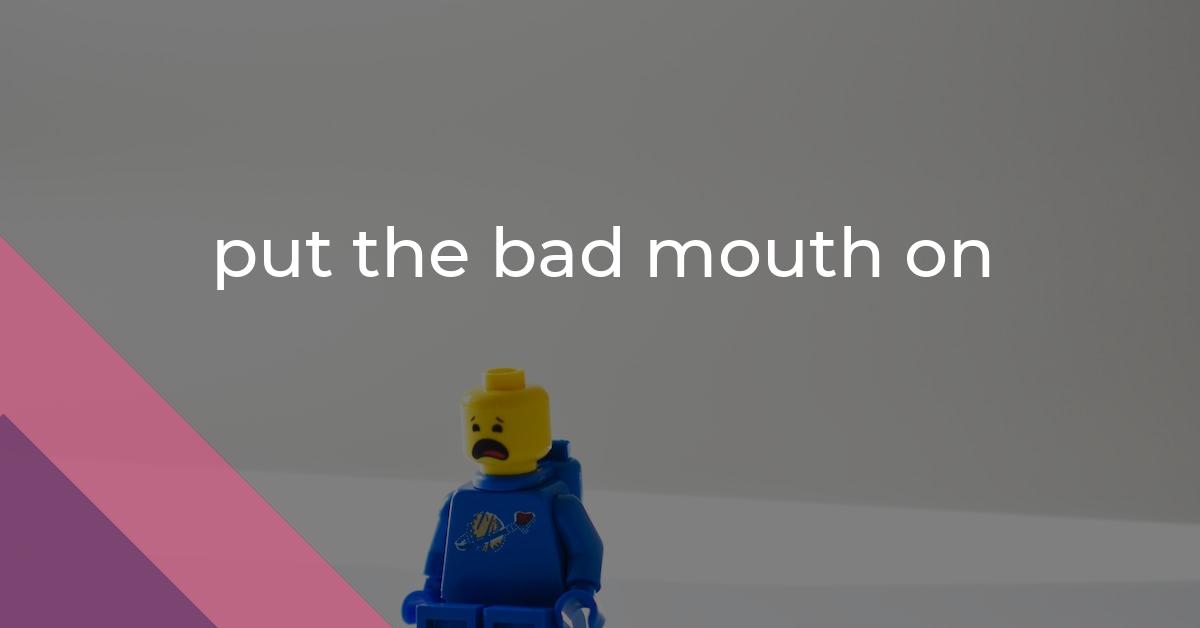put the bad mouth on: Idiom Meaning and Origin
What does ‘put the bad mouth on’ mean?
The idiom put the bad mouth on means to speak negatively or criticize someone or something. It implies spreading harmful or derogatory information about the subject.

Idiom Explorer
The idiom "tell against" means to work or speak in a way that is unfavorable or damaging to someone or something.
The idiom "save someone's face" means to protect someone's reputation or dignity by preventing them from feeling embarrassment or humiliation.
The idiom "salt in the wound" means to worsen an already difficult or painful situation, often by adding insult to injury.
The idiomatic expression "run off at the mouth" means to talk excessively and often without thinking before speaking, often resulting in saying foolish or inappropriate things.
The idiom "run at the mouth" means to talk excessively or without control, often using inappropriate or boastful language.
The idiom "rumor mill" refers to the circulation of unverified information or gossip within a group or community.
An idiom that refers to the spreading of false information or gossip about someone or something, often with the intention of damaging their reputation.
The idiom "rub someone the wrong way" means to irritate or annoy someone, often due to a mismatch in personalities or preferences.
The idiom "rub salt in the wound" means to worsen a difficult situation by adding insult or further distress to someone who is already suffering or upset.
The idiom "rub salt in someone's wounds" means to deliberately make someone's pain or sadness worse by reminding them of a painful experience or adding insult to injury.
FAIL
The idiom "put the bad mouth on" is a colloquial expression that originated in the United States. It is commonly used to describe the act of speaking negatively about someone or something, often with the intention of causing harm or damage to their reputation.
One important aspect of this idiom is its use of the word "bad" as an adjective to describe the type of speech or language being used. In this context, "bad" indicates that the words spoken are disparaging, critical, or malicious.
The phrase "put the bad mouth on" can be traced back to African-American Vernacular English (AAVE) and has been in use for several decades. Its origins are rooted in African-American culture and have been passed down through oral tradition and everyday conversation.
When someone puts the bad mouth on another person, it can have various effects. The targeted individual may experience a tarnished reputation, damaged relationships, or diminished opportunities.
This idiom is often used in informal conversations or gossip situations, where individuals may engage in negative talk about others. It can also be used in a more serious context, such as when discussing slander or defamation.
It is interesting to note that the phrase "put the bad mouth on" is not commonly used in formal or professional settings. It is more prevalent in casual conversations or within specific social groups where it is understood and accepted.
An idiom related to "put the bad mouth on" is "rumor campaign". This idiom refers to a concerted effort to spread rumors or false information about someone with the intention of damaging their reputation or credibility. It is similar to "putting the bad mouth on" someone in that both involve speaking negatively about someone with harmful intent.
Another related idiom is "tell against". This idiom means to speak or give information that will negatively impact someone or something, often serving to the advantage of someone else. It aligns with the idea of "putting the bad mouth on" someone, as both involve speaking in a way that is detrimental to the target.
A third related idiom is "rotten egg". This phrase is used to describe a person who is considered to be untrustworthy, unreliable, or malicious. It shares a similar connotation with "putting the bad mouth on" someone, as both involve speaking ill of someone and casting them in a negative light.
A final related idiom is "run at the mouth". This idiom describes someone who talks excessively or without restraint, often saying things that are inappropriate or offensive. It can be seen as a more exaggerated version of "putting the bad mouth on" someone, as it suggests a lack of control or consideration for the impact of one's words.
The idiom "put the bad mouth on" originated in the United States and is used to describe the act of speaking negatively about someone or something. It suggests an intention to cause harm or damage to the target's reputation.
The phrase reflects the power of words and their potential to harm, highlighting the casual and informal nature of certain conversations. While it may not be commonly used in formal settings, it remains a vivid reminder of the impact words can have on individuals and their relationships.
Example usage
Examples of how the idiom "put the bad mouth on" can be used in a sentence:
1. Sheila put the bad mouth on her ex-boyfriend when she spread false rumors about him.
2. The politician's opponent tried to put the bad mouth on him by portraying him as corrupt and dishonest.
3. The critic put the bad mouth on the new movie, claiming it was the worst film she had ever seen.
More "Slang" idioms



